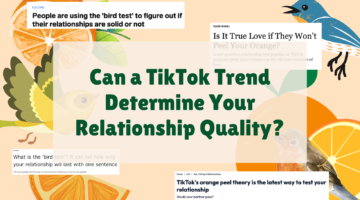What are the Most Effective Pick-Up Lines? Here’s What the Science Says
April 6, 2020 by Justin Lehmiller
For decades, researchers have been studying the effectiveness of different kinds of pick-up lines in order to better understand the psychology of attraction. What they’ve found is that certain types of lines definitely seem to work better than others—and the results have been surprisingly consistent over the years.
One of the earliest studies in this area (published in the 1980s) concluded that men and women alike tend to prefer a more direct approach compared to cute, crude, and flippant opening lines.
For example, people rated compliments as most likely to succeed, such as “I’d really like to get to know you” and “You have really nice [hair, eyes, etc.].” By contrast, flippant remarks like “Bet I can outdrink you” and “I’m easy, are you?” were rated very poorly. For a more detailed summary of what they found in this study, check out this article.
In a modern update to this research recently published in the journal Personality and Individual Differences, researchers found that a similar pattern emerged when looking specifically at pick-up lines used by women on men. However, this study went a bit further and found that it wasn’t just the lines themselves that mattered, but also the attractiveness of the person delivering them.
They divided pick-up lines into three categories:
· Innocuous lines: “Can you recommend a good drink?” “I’ve seen you before, do you work here?” “Where did you get that tattoo? Did it hurt?” and “Hi.”
· Direct lines: “Want to have a drink together?” “You have really nice eyes” “Can I have your number?” and “You’re cute.”
· Flippant lines: “Shall we talk, or continue flirting from a distance?” “I always see you here, you must be the bar’s best customer!” “Since you’re alone and I’m alone, why don’t we sit together?” and “I’m easy, are you?”
A sample of heterosexual men aged 18-56 recruited online were asked to evaluate the effectiveness of each line. They were also shown a photo of a woman reported to have used the line so that the researchers could further examine whether attractiveness and style of dress play a role in how these lines are perceived.
Consistent with previous studies, the direct lines (where people openly communicate their interest and/or offer a compliment) were most preferred, followed by flippant lines, then innocuous lines.
However, direct lines were considered most effective when delivered by a woman who was highly attractive, regardless of how she was dressed. Direct lines were less effective for women of lower attractiveness, but were more effective when she was dressed in a way that revealed more of her body.
These findings add some interesting nuance to our understanding of how pick-up lines work: the way they are perceived depends, in part, on the appearance of the person delivering them.
So why do direct lines tend to be preferred to other approaches? There are likely a few reasons. One is that they are unambiguous—they clearly communicate sexual/romantic interest without leaving room for guesswork. Another is that many of the direct lines include a compliment. We know that one of the keys to attraction is making another person feel good, so saying something nice and providing a little self-esteem boost really seems to go a long way.
Want to learn more about Sex and Psychology? Click here for more from the blog or here to listen to the podcast. Follow Sex and Psychology on Facebook, Twitter (@JustinLehmiller), or Reddit to receive updates. You can also follow Dr. Lehmiller on YouTube and Instagram.
To learn more about this research, see: Fisher, M. L., Coughlin, S., & Wade, T. J. (2020). Can I have your number? Men’s perceived effectiveness of pick-up lines used by women. Personality and Individual Differences, 153, 109664.
Image Source: 123RF
You Might Also Like:

Dr. Justin Lehmiller
Founder & Owner of Sex and PsychologyDr. Justin Lehmiller is a social psychologist and Research Fellow at The Kinsey Institute. He runs the Sex and Psychology blog and podcast and is author of the popular book Tell Me What You Want. Dr. Lehmiller is an award-winning educator, and a prolific researcher who has published more than 50 academic works.
Read full bio >


